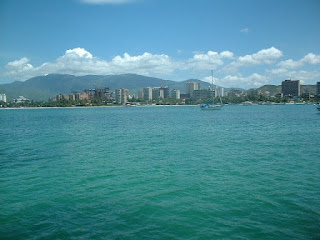


Margarita is an island about 40 miles from the coast of Venezuela. It is a resort island for Venezuelans. The anchorage is surrounded by many high-rises reminding us of Miami. As has often been the case, there are many buildings that are in disrepair and lots of construction of new buildings. Gas and water are very cheap here, but we have found them hard to get, an unexpected situation. When we say cheap, we are talking 11 cents for a gallon of gas! Now of course that doesn't include the taxi to get to the gas station--$5 round trip. Bottled drinking water was about $2 for 5 litres and beer is 20 cents a bottle in stores--50 cents at the marina. We are informed that inflation is 30% here and prices are going up, up, up.
 Water for our tanks was obtained from a fellow named Carmelo, who promised faithfully every day for two weeks that he would bring us water. Finally, the day before we left, he arrived. He fills tanks on his pirogue, a type of boat used in many islands by the locals.
Water for our tanks was obtained from a fellow named Carmelo, who promised faithfully every day for two weeks that he would bring us water. Finally, the day before we left, he arrived. He fills tanks on his pirogue, a type of boat used in many islands by the locals. Clearing in here was an all-day affair. We had to turn over our passports and boat registration to our agent at 9 a.m.. (We were informed it's much better to pay an agent to take care of clearing in because you would spend the same amount using a taxi to get to all the appropriate places not to mention the amount of time it would take.) We were to return at to sign documents and get fingerprinted. We were to return again at 5 to pick up the documents! Whew! Juan Baro who runs Marina Juan and was our agent, has a small shop at the end of a long dock. There he has a book swap and mini-mart. Three days a week he provides a bus to a local shopping mall. Since it was Friday and the bus was there, we went to the mall. Of course, we had yet to obtain any Venezuelan currency, bolivars. Sadly, we found that no one would change our American dollars unless we had passports. Finally, we discovered that we could in fact use our credit card or an ATM card, which we had been avoiding because of the foreign currency transaction charges of 2%. When we returned, Juan told us whom we could see to change our dollars into bolivars. Yes, another trip to town via taxi, but we were successful.
Shopping excursions are made available by Juan Monday, Wednesday and Friday. There is usually a full busload of cruisers anxious to replenish their stores. Purchases made by the cruisers are boxed at the grocery store by a store employee who labels them by the number on a pass Juan provids for the trip. Then they are loaded into a separate truck and delivered to the dock. They are stacked according numbers. Shoppers can claim their loot only when all unpacking has been done.

Then Pedro (in the straw hat), Juan's dockhand, assists each person to their dinghy with a hand cart. All in all, this is a good service and an enjoyable outing.
We met our friend from Grenada, Jose, who has building projects here and in Puerto La Cruz. He graciously carted us all over town to buy a phone and two air conditioners. Again, passports were required to buy anything and the phone company fingerprinted Mike. We had met Jose and his family in Grenada as we were hiking a very steep hill to the bus station when he offered us a ride. The next day his family visited our boat and we made plans to see them in Margarita and in Puerto La Cruz. Jose and Elizabeth prefer living in Grenada, they say, as it is safe. They feel unsafe in Venezuela and don't wish to raise their family there. They visit Venezuela frequently, though, because they still have homes and family here.
With his family still in Grenada until school is over, Jose and his friend Oscar took us to a very upscale mall, Sambil. Very impressive! It was new with all the stores one sees in the states (not the department stores, though) and huge.
With his family still in Grenada until school is over, Jose and his friend Oscar took us to a very upscale mall, Sambil. Very impressive! It was new with all the stores one sees in the states (not the department stores, though) and huge.
No comments:
Post a Comment